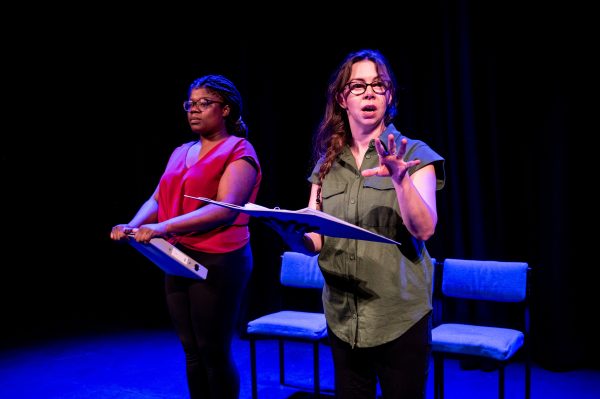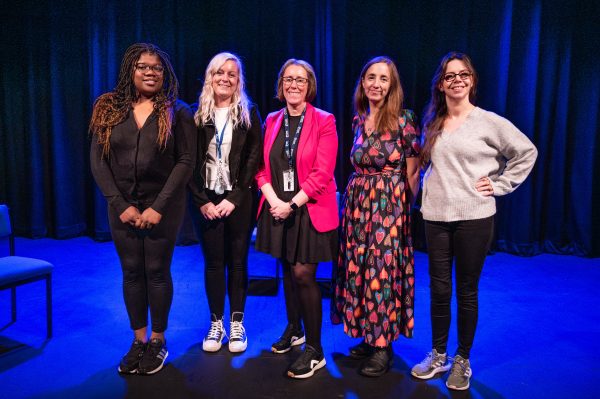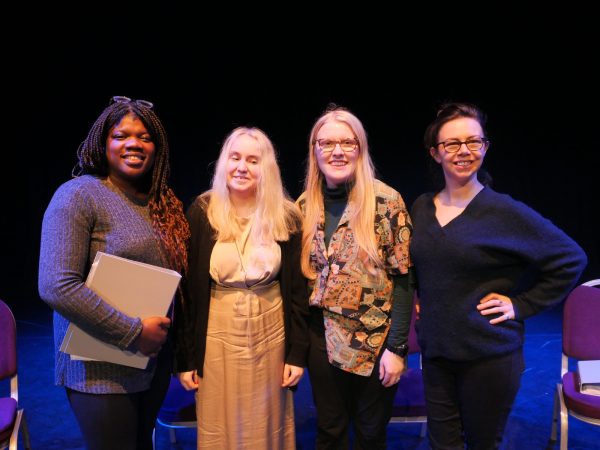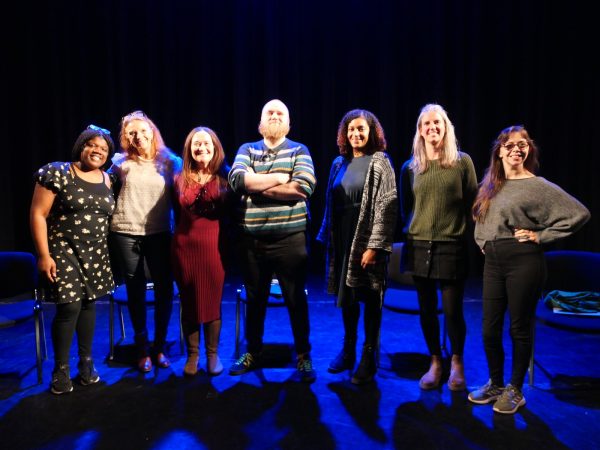Unseen Tour

Unseen live event, October 2024, featuring Anita Barzey & Georgie Wyatt.
Throughout October, team Extant has been ‘on the road’ with a unique touring event, based around our audio drama ‘Unseen’. It was a fantastic opportunity to re-visit some of the venues we’ve toured to previously and bring our groundbreaking work to both existing and new audiences.
Back at the start of 2024, Extant created ‘Unseen’, a gripping audio drama that examines the subtle and insidious effect of domestic abuse on the blind and visually impaired community. The work is a creative response to The Unseen report, commissioned by Fight for Sight (forged from a merger with Vision Foundation), and researched and compiled by the charity SafeLives. This report highlighted the inaccessibility of domestic abuse services to visually impaired people, even though disabled people are nearly three times more likely to experience domestic abuse than non-disabled people. Creating this audio drama continued in Extant’s illustrious history of dramatizing fact-based reports to bring them to a wider audience through imagination and creativity.
For our tour we combined a live performance of excerpts from the ‘Unseen’ audio drama, acted by two VI performers, Anita Barzey & Georgie Wyatt, followed by a panel discussion with members of the creative team including the director Ben Wilson, script editor Louise Hall, and sound designer Ian Rattray, plus representatives from different organisations that supported the making of the work. The tour was also supported by an access worker, Becky Newman, the producer Louisa Sanfey, and Extant’s Operations Director Ian Abbott. We decided on this format to allow for a small taster of the drama and have space for conversations with experts and the public about domestic abuse’s impact for the VI community.
We toured to three physical locations: the Arena Theatre in Wolverhampton, the Lowry in Salford, and the Bloomsbury Festival in London. We also held an online event, and the full audio drama was broadcast on Bloomsbury Radio. The show had a different local flavour at each of the locations, based on the combination of panellists and audience who attended. However, there were also some common themes and questions across all the events. We felt the conversations were so important, that we wanted to share some highlights here.
At our first stop in Wolverhampton, the focus was around local concerns and improvement of services available to VI survivors of domestic abuse. Our panellists here were Helen Brown, Head of Impact and External Income at sight-loss organisation Beacon Vision, Anna Walsh, the CEO for local housing association CHADD, and Dani Walker, an IDVA (Independent Domestic Violence Advocate) from CHADD. The speakers explained how the Unseen Report inspired their organisations to work together on staff training, and to consult with the VI community to create a toolkit to help refuges become more accessible for people with sight loss. This toolkit has been distributed to sight loss charities across the country, to encourage stronger pathways for referrals and help VI survivors get the support they need. The audience had many follow-up questions for our speakers around how the toolkit is being rolled out in the West Midlands and nationally. The project has led to an increase in referrals, and the organisations also plan for the toolkit to be shared with other services including police and social services. There was also praise for the performance, particularly how it highlighted the ways in which gaslighting, and coercive control build up over time, and the vulnerability of VI people abuse by people in a carer role. Being so Wolverhampton-focussed, the conversation felt both practical and inspiring, with many people leaving the session with added items on their to-do list!

Unseen live event, Arena Theatre, October 2024, Photo credit: Graeme Braidwood, featuring from left to right: Anita Barzey, Dani Walker, Anna Walsh, Helen Brown & Georgie Wyatt.
Our next stop was the Lowry in Salford, where our event took place following an arts conference led by Manchester-based organisation Art with Heart, so the audience was packed with arts workers which led to a more arts-focused direction to the discussion. The panellists were Kerry Firth, Grants Manager at Fight For Sight, and Helena Ascough, one of Extant’s workshop facilitators who supported therapeutic writing sessions for VI survivors of abuse. Kerry talked about how the Unseen Report was first conceived: following lockdown, Fight For Sight commissioned research into VI people’s experience of domestic abuse, having realised anecdotally from speaking to community members that there were no existing studies into this subject. They received an overwhelming response and were able to put this data into the Unseen Report alongside recommendations around training and awareness raising. The audience also asked questions about the making of the audio drama, and how the team had worked sensitively with VI survivors to run writing workshops that gave participants therapeutic creative tools to explore their own stories.

Unseen live event, The Lowry, October 2024, featuring Anita Barzey, Kerry Firth, Helena Ascough & Georgie Wyatt.
Our final in-person event was at the Bloomsbury Festival in London, where we had our largest panel – and audience – yet. On the panel were Charlotte Giarnese & Heather Carmichael from Safe Lives, Kim Creus, the Marketing and Communications Manager for Fight For Sight, and the Workshop Lead & Script Editor for ‘Unseen’, Louise Hall. The team from Safe Lives spoke about how the Unseen Report led to in-depth training for IDVAs to help them feel more confident when working with VI survivors. They are also now starting to work with sight loss professionals to help them recognise and respond to signs of abuse. There was discussion with the audience about the need to recognise the potential for carer abuse and to ensure space is created to give VI people confidentiality, particularly in settings like healthcare. There was discussion around intersectional barriers that people may face, such as cultural barriers, race or sexuality, abuse faced by male VI survivors, and the additional barriers to seeking help faced by disabled people.

Unseen live event, Bloomsbury Festival, October 2024, featuring from left to right Anita Barzey, Heather Carmichael, Louise Hall, Ben Wilson, Charlotte Giarnese, Kim Creus & Georgie Wyatt.
There is often a misconception that the default response is to remove a victim from their home, which may be a huge barrier for a VI person seeking help who, to paraphrase the audio drama “don’t feel blind in their own home.” However, the panel were keen to spread awareness that that is not always the case, especially for disabled people & families, as service providers are starting to recognise that an individualised response works better than a one-size-fits-all policy. Always the mark of a great evening, we ran out of time to answer all questions, and the discussion had to continue in a nearby pub!
Our final stop on the tour was an online event, with a fantastic panel including many returning from the in-person events: Charlotte Giarnese & Heather Carmichael from Safe Lives, Kerry Firth from Fight For Sight, ‘Unseen’ team member Louise Hall and the VI domestic abuse activist Saliha Rashid, who consulted with the audio drama’s creative team during the devising process. This group rounded off in style, with a wide-ranging discussion about the Unseen Report’s impact, and changes that have already come about thanks to this research and funding from Fight For Sight.
Safe Lives have delivered webinars to over five hundred professionals with more planned. Saliha spoke of her shock at being the first person to raise these issues at parliament, and her pride at being involved at every stage of the Unseen Report, including rehearsals for ‘Unseen’. Being an online room full of VI artists & creatives, there were plenty of audience questions about the creative process for making the audio drama, including questions about the process of editing and choosing which stories to include, given the diversity of the VI community. Members of the creative team talked about how they focussed on the survivors’ voices, drawing on real-life examples and homing in on types of abuse that are unique to VI people. Director Ben Wilson spoke of the real consequences of everyday ableist prejudice and lack of independence for VI people, which was highlighted in the drama.
One question that came up across all panels was for advice around what to do if you believe that someone you know is in an abusive situation. The advice that came back was to try to ask questions and be supportive, but not to push someone to act until they are ready. It is also good to seek advice from the domestic abuse sector, and a great starting point is always the freephone National Domestic Abuse Helpline on 0808 2000 247. For more information and contact details for other services, Extant have a list of resources available at https://extant.org.uk/productions/unseen
Louisa Sanfey, Artist Development Manager, November 2024